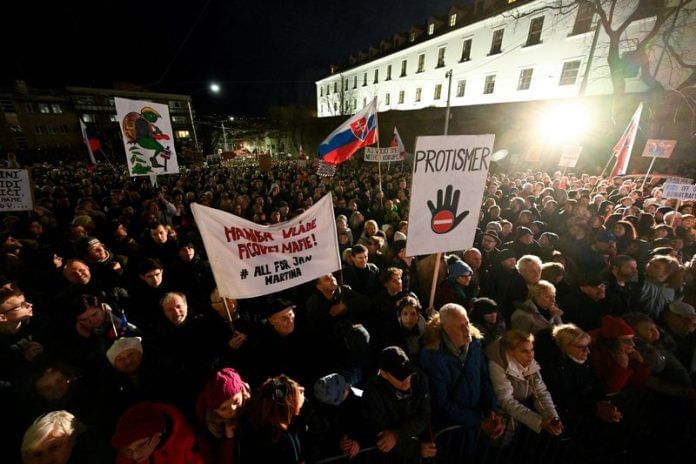(Reuters) – The Slovak parliament approved reforms scrapping a special prosecution branch dealing with high-level crime and lowering punishments for financial crimes in a fast-track procedure on Thursday, amid public protests and concerns from the European Commission.
The government of Prime Minister Robert Fico, who took power last October for the fourth time after a stint in opposition, has argued the changes are necessary to end what it called excesses at the Special Prosecutor’s Office and what it called bias against the now-ruling SMER-SSD party.
“The past government … disrupted principles of the rule of law and violated human rights,” SMER deputy Tibor Gaspar, a former police president who has been the subject of ongoing investigations, told parliament.
The government said the changes modernise the criminal code by lowering long prison terms and preferring alternative punishments.
President Zuzana Caputova immediately signalled she would try to stop the changes, possibly through a veto or a court challenge.
The opposition, and tens of thousands of Slovaks who protested at rallies across the country in the past weeks, say the changes will protect Fico’s political and business allies from investigations.
The law was a “monstrous amnesty” for that circle, said deputy Michal Sipos from the opposition Slovensko party.
The European Commission called on the government in December not to fast-track the changes, and raised concerns over some of the reforms including continuity of investigation of high-level corruption and sufficient protection of EU funds, according to a letter sent to the Slovak government and seen by Reuters.
An EU official said on Thursday the commission’s concerns remained, which could possibly lead to legal action and budgetary consequences. It has taken similar steps against Poland and Hungary in past years.
The government has said it was consulting the EU on the reform and made some last-minute changes to its proposal, but it was not clear whether this would ease the concerns.
(Reporting by Jan Lopatka in Prague; additional reporting by Gabriela Baczynska in Brussels; editing by Jonathan Oatis)
Disclaimer: This report is auto generated from the Reuters news service. ThePrint holds no responsibilty for its content.






